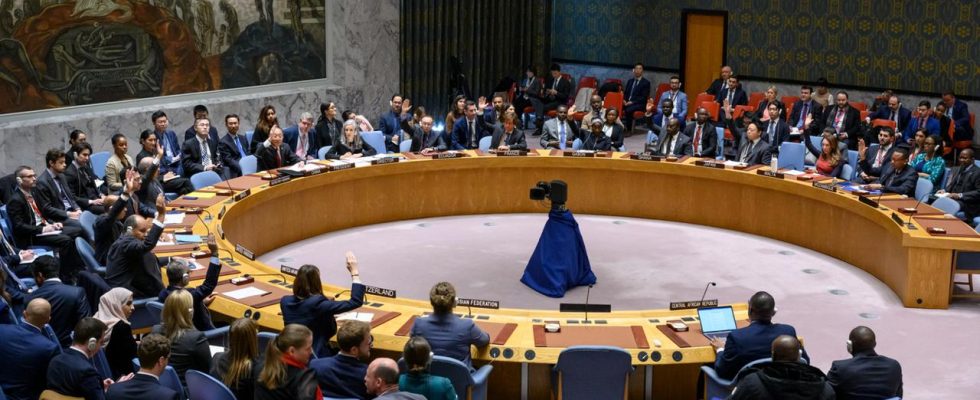The UN Security Council has adopted a resolution that is binding under international law calling for a day-long ceasefire in the Gaza Strip. Israel said there would be no longer ceasefire before the hostages were released.
The UN Security Council has adopted a Gaza resolution calling for a day-long ceasefire. After a long struggle, the most powerful UN body in New York agreed on the joint resolution. The USA waived a veto and abstained, as did Russia and Great Britain. 12 of the 15 member states voted in favor of the text. Resolutions of the Security Council are binding under international law and can thus develop international influence.
The resolution introduced by Council Member Malta calls, among other things, for “urgent and extended humanitarian pauses and corridors throughout the Gaza Strip for a sufficient number of days” to ensure humanitarian assistance in accordance with international law.
But there is no talk of a formal ceasefire. The text focuses heavily on the suffering of Palestinian minors. It expresses “deep concern about the humanitarian situation in the Gaza Strip and its serious impact on the civilian population, in particular the disproportionate impact on children.”
Demand for compliance with international law
All parties to the conflict are required to comply with international law, a “forced relocation of the civilian population” is rejected, and vital services must not be withheld from the people in the Gaza Strip. According to diplomats, these positions should be understood with regard to Israel’s actions in the region – although the country is not mentioned by name throughout the document. The text only mentions the Islamist Hamas, which attacked Israel on October 7th and carried out a massacre of civilians with around 1,200 deaths, in its demand for the release of the Israeli hostages kidnapped to the Gaza Strip.
Until shortly before the vote, it was questionable whether the USA, as Israel’s closest ally, could tolerate the adoption of the resolution. In October, Washington vetoed a draft because, among other things, it did not emphasize Israel’s right to self-defense. The resolution that has now been adopted does not address this, nor is there any condemnation of the Hamas massacre on October 7th. The USA, like China, Russia, France and Great Britain, has veto rights. The Council also has ten member states elected for two-year terms. A resolution needs at least nine of the 15 votes, and there can be no veto.
Israel: No ceasefire without hostage release
Israel reacted promptly to the resolution and rejected any longer humanitarian ceasefire as long as the 239 hostages are in the control of the Islamist terrorist organization Hamas. The Israeli Foreign Ministry said in the evening: “Israel calls on the UN Security Council and the international community to resolutely demand the release of all Israeli hostages, as set out in the resolution.” The statement also said: “Israel expects the Security Council to unequivocally condemn Hamas and comment on the need to create a new security situation in the Gaza Strip.”
There was immense pressure on the UN Security Council ahead of the resolution – after weeks of negotiations to reach a common position. Until Wednesday, drafts had failed, among other things, due to the vetoes of the USA on the one hand and Russia and China on the other. The UN General Assembly with its 193 members passed a resolution that was significantly more critical of Israel at the end of October with a large majority. Germany abstained at the time. This decision was not binding under international law.

